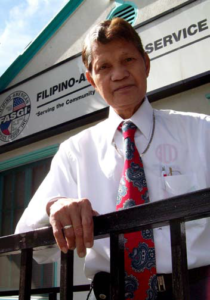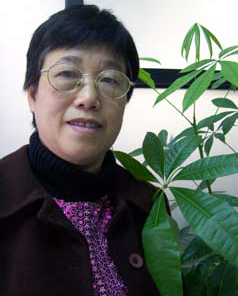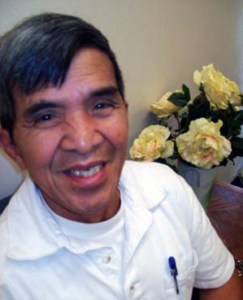
The Senior Community Service Employment Program (SCSEP) is the only job training program focused exclusively on helping older Americans return to the workforce. The program assists low-income unemployed adults aged 55 years and older by providing job training through temporary paid work experiences that can lead to unsubsidized employment. Older workers are critical to the American economy, making up 35 percent of the U.S. labor force by 2020. While employers view older workers favorably for their experience, knowledge, professionalism, work ethic, and loyalty, older Americans struggle to return to the workplace once they’ve lost a job. In the case of Asian American and Pacific Islander American (AAPI) older adults, they struggle with simply entering the workplace because of limited English proficiency and cultural differences.
AAPI older adults are one of the fastest growing population groups in the United States; there are currently 3.3 million AAPI older adults (3.2 Asian American and 162,000 Native Hawaiian and other Pacific Islander). Between 2010 and 2050, the AAPI older adult population is expected to grow by 310 percent, while the total population of non-AAPI older adults will grow by 79 percent and the total U.S. population 42 percent.
In 1989, the National Asian Pacific Center on Aging (NAPCA) became the first national SCSEP grantee to serve AAPI older adults and customize recruitment and training so that it is linguistically and culturally appropriate. In fiscal year 2016, we served just under 1,000 participants through 10 project sites in eight states and partnered with over 420 nonprofit organizations that contributed more than $1.17 million of in-kind support back into the communities. In addition, approximately 668,000 hours of community service were provided by NAPCA SCSEP participants at a value of over $15 million.
With the impending threat by the White House to completely eliminate the SCSEP program in its FY18 budget, it’s important that we highlight the many success stories of the SCSEP program and its impact in our local communities. We highlight the following three success stories of AAPI older adults who, through SCSEP, learned new relevant skills, developed work experience and gained confidence to enter and reenter the challenging workforce through permanent employment opportunities.
***
Geronimo F. “Gerry” Ignacio
Receptionist/Office Support, Filipino American Service Group, Los Angeles
 We arrived by May 26. The first week of June, I immediately got my green card. The second week, I got my Social Security. By July, I started applying to different companies here, trying my luck. If I were a manager in the Philippines, I’ll be in maintenance here. If I were in marketing manager in the Philippines, I’ll be just an ordinary person here. I need a job. So I try to apply at Target, Macy’s, those different kind of malls, you know, and some different offices here. I’ve been waiting for the calls. Maybe it’s not yet time. So July, August, September, trying to apply every day.
We arrived by May 26. The first week of June, I immediately got my green card. The second week, I got my Social Security. By July, I started applying to different companies here, trying my luck. If I were a manager in the Philippines, I’ll be in maintenance here. If I were in marketing manager in the Philippines, I’ll be just an ordinary person here. I need a job. So I try to apply at Target, Macy’s, those different kind of malls, you know, and some different offices here. I’ve been waiting for the calls. Maybe it’s not yet time. So July, August, September, trying to apply every day.
I don’t know where to go. I applied, applied. So I talked to a lady and she told me, “Hey Gerry, I need you here at the Filipino American Service Group because I know you got a lot of experiences back in the Philippines as I’m reading your resume. So go to NAPCA.”
One of my responsibilities is that, aside from answering the phone, aside from taking intake for those homeless applying here, aside from entertaining guests, aside from filing, faxing, keeping some important documents, I have to do some computer work. A simple event program, I can do it – let’s say Thanksgiving Day, come and join us! Things like that. I’m able to do that on the computer now.
I was enrolled 2007, November, and my wife was enrolled 2008, March. Both of us work in [SCSEP]! So NAPCA really helps me a lot now, paying the bills in the house, paying for my car, paying some of my debt, credit and things like that. Without NAPCA, how can we handle this one? Me and my wife.
If I can still work, I like to help those people, this community, those veterans, those seniors. I don’t like staying at home. I like helping people as long as I can. I want to show my family that they will be proud of me.
***
 Jie Yi Chen
Jie Yi Chen
Office Aide, Chinese American Service League, Chicago
I went to school in Guangzhou for high school and college. I speak Cantonese and Mandarin. I majored in designing parks and gardens. In 2000, I come to America. I want to have a better environment for my daughter. My daughter is studying in the United States. We came together when she was 12. Before we came here, my family was already here. My father, mother, brother and sister also here.
The language is the most difficult part. When I come here, I work in downtown, one of the restaurants. I saw the parks, the gardens there. But I cannot do it because I don’t know the language here.
In November, 2004, I changed to another restaurant, fast food restaurant. I learn English in the restaurants. In 2008, I lost my job. My boss, maybe I am too old, maybe I cannot do the highly technical work. So, at that time, I layoff. Somebody found flyers, poster, about Title Five program in this agency and leave it for me. I come here to apply.
Now, I work in the resource center. I help other people, laid off people, find a job. I am very happy to help other people. I want other people also to have this opportunity. I want to contribute to society. I want to do something. I’m very happy. I feel I’m doing something for the community.
I like America. Here is better than China. I’m older, but this program is for me so I feel cared for. I feel I have something to do here. I never dreamed about when I was at the lowest point, with no job, very difficult. This program helped me.
If you stay home, your view will be very narrow. So you go outside, you have to meet different people, different things. It’s good for your mind. I earn some money so I can pay for my living, but mentally, my spirit has deep support. I feel rejuvenated.
Anything I can do, I will do it. I’m not afraid of difficulties, learning language. I’m learning it. Young people should not afraid of difficulty. They should work hard, solve problems one by one. It will help overcome the dark part of your life.
***
Nghia Ngo
Office Assistant, Vietnamese Community of Orange County, Santa, Anna, California
 I was an officer for the old government in South Vietnam. After the War, I was in jail for seven years. When I got out, the new government still followed my every step. I just can go to the field, bring rice, and live by the food from the field for myself and my family. And I just worked that very hard life until I got a chance to go to the United States. I applied and I came in 1995.
I was an officer for the old government in South Vietnam. After the War, I was in jail for seven years. When I got out, the new government still followed my every step. I just can go to the field, bring rice, and live by the food from the field for myself and my family. And I just worked that very hard life until I got a chance to go to the United States. I applied and I came in 1995.
It’s a very good change for me to get out of Vietnam. I feel very happy with the freedom and chance for work. The most important thing to me is freedom.
At first, I got help from the U.S. government. After one year, I tried to work. I found time to take care of the family and drive my daughters back and forth to school. Then I worked in a sewing shop. I priced clothes, made the clothes to be beautiful before showing to customers. I worked very hard with a lot of hours, low salary.
I worked there until I got the chance to know about NAPCA. I learned about it from my friend. We were in jail together in Vietnam. When we came here, we met again, and he introduced me to apply. I was very happy to go through the training at the health center at the Vietnamese Community Center. After two years, they hired me.
I learned how to use the computer, do filing of patient records, and help people find a doctor. Many Vietnamese who come here don’t know how to read and write Vietnamese. I help them fill out the forms in Vietnamese. It is a very busy place. I am willing to help with everything. That’s why they hired me.
It is very good place to work. Everyone – supervisor, manager and coworker – just treats one another like a family. So it’s not only work, but we help each other. I have a great feeling about working there, about the salary also.
I have a good life because before, working in the sewing shop, sometimes they have something for me to do, sometimes not. So I was very worried. But here, I work every day, every week, every month, and every year. I feel very good about the steady job, and I feel very good, not only about financial, but about my life. I feel very comfortable.
***
Read more NAPCA success stories at:
http://napca.org/wp-content/uploads/2012/09/Senior-Voices.pdf
http://napca.org/wp-content/uploads/2012/09/SE-Asian-Voices.pdf
http://napca.org/wp-content/uploads/2012/09/Pacific-Islander-Voices.pdf
The opinions expressed in this article are those of the author and do not necessarily reflect those of the Diverse Elders Coalition.

